| |
| |
| |
| Presented By Malwarebytes Small Business Solutions |
| |
| Axios World |
| By Dave Lawler ·May 10, 2021 |
| Welcome back to Axios World. - Thanks for all the enthusiastic feedback about the map game — guess I'd better keep it going!
- We're starting tonight (1,612 words, 6 minutes) with the breaking news from Jerusalem and Gaza, surveying the world's sputtering democratic uprisings, and ending with a vivid portrait of a high-stakes assassination.
New arrival? Sign up, and tell a friend. |
| |
| |
| 1 big thing: Jerusalem clashes spark exchange of fire |
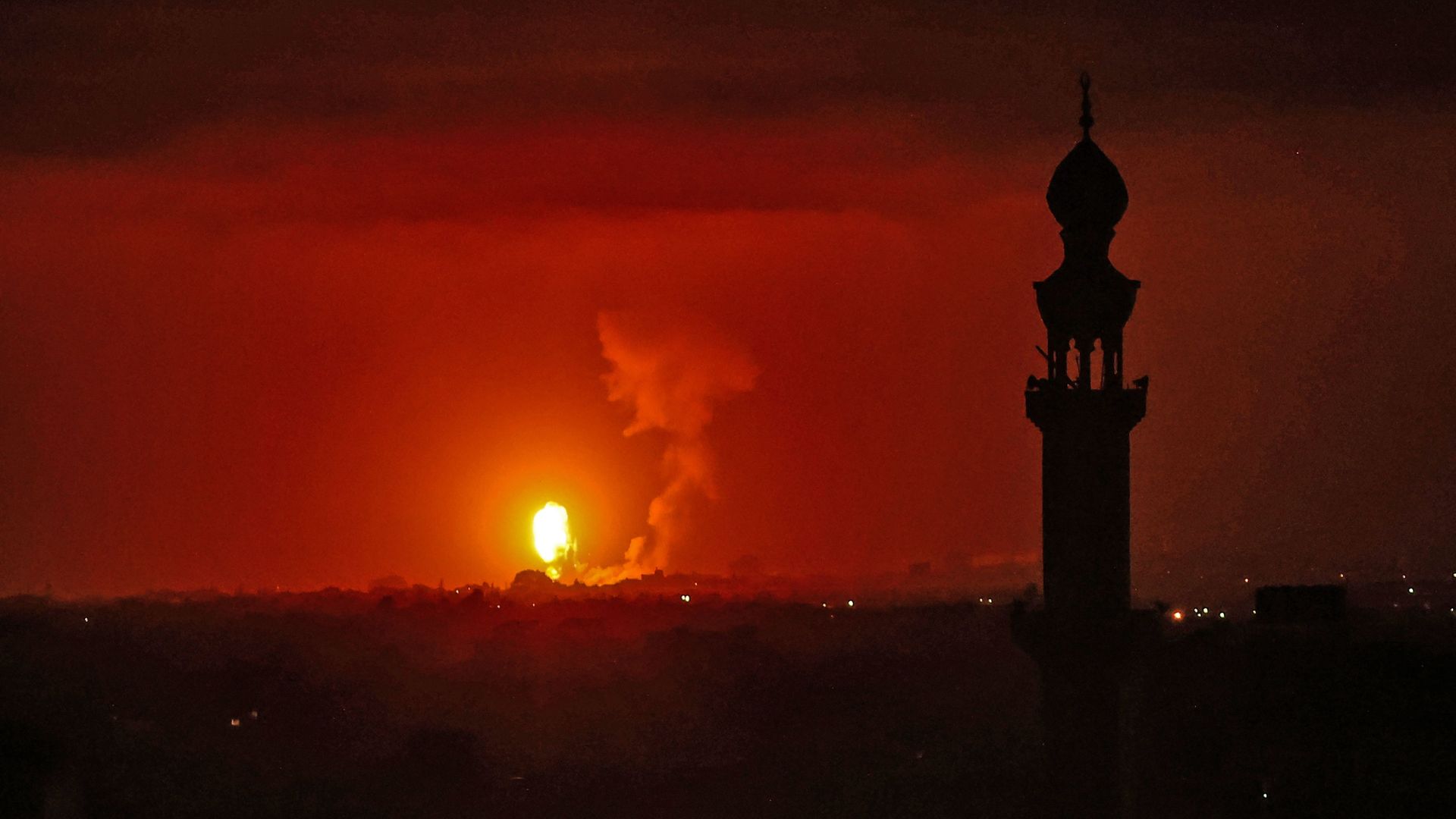 |
|
| An Israeli airstrike in southern Gaza. Photo: Said Khatib/AFP via Getty |
| |
| Israel has launched a military campaign in Gaza after Hamas fired a barrage of rockets, including toward Jerusalem. Why it matters: The exchange of fire followed days of tension in Jerusalem. It's already the most significant escalation in months, and the first time Hamas has fired rockets at Jerusalem since 2014. Israel says its military response could last several days, Axios' Barak Ravid reports from Tel Aviv. The state of play: Gaza health officials say at least 20 Palestinians have been killed in Israeli airstrikes, including nine children. The Israeli military, meanwhile, says Hamas has fired over 150 rockets toward Israel, some of which were intercepted. Driving the news: The day began with a raid by Israeli security forces on Jerusalem's al-Aqsa Mosque compound, or Temple Mount, one of the holiest sites for both Muslims and Jews. Around 300 Palestinians were wounded, with 10 in critical condition. - That followed days of clashes over the planned eviction of six Palestinian families from a Palestinian neighborhood in East Jerusalem to make way for Jewish settlers.
- In a tense call on Sunday, White House national security adviser Jake Sullivan urged his Israeli counterpart, Meir Ben-Shabbat, to take steps to de-escalate the situation as Israeli nationalists were preparing to mark the anniversary of Jerusalem's reunification under Israeli control.
- Prime Minister Benjamin Netanyahu ordered the closure of the Temple Mount to Jewish visitors and the rerouting of an annual parade so that it would not pass through the Muslim Quarter and the Damascus Gate, two potential flashpoints in the Old City of Jerusalem.
But Hamas gave Israel an ultimatum on Monday afternoon, threatening military action if Israeli police didn't leave the al-Aqsa Mosque compound. - Minutes after the deadline expired, Hamas fired rockets from Gaza toward Jerusalem — around 50 miles away.
- Israel swiftly responded with strikes of its own, and the Israeli Security Cabinet convened for an emergency meeting to decide on a wider response.
- "All the ministers and security officials in the meeting agreed we can't keep quiet after missiles were fired on Jerusalem," a minister from the Security Cabinet told Barak, adding that the campaign would be wide-ranging.
What they're saying: - Netanyahu said Hamas had "crossed a red line" and added that "the current confrontation could take some time."
- Senior Palestinian Authority officials said they were considering their own response to the "storming of al-Aqsa," an act that President Mahmoud Abbas said would pose a "new challenge" for the Biden administration.
- The U.S. has called for de-escalation, but State Department spokesperson Ned Price also condemned the Hamas attacks and said Israel had the right to defend itself.
What to watch: The current escalation comes amid deep political crises on both the Palestinian and Israeli sides. |
    |
| |
| |
| 2. State of the outbreak: China's vaccines on trial |
 |
|
| Illustration: Sarah Grillo/Axios |
| |
| The World Health Organization authorized China's Sinopharm COVID-19 vaccine for emergency use on Friday, making it the sixth vaccine to receive clearance from the global health agency, Axios' Jacob Knutson writes. Why it matters: The vaccine can now be included in the COVAX initiative, which aims to supply low- and middle-income countries but has struggled with massive supply shortfalls. - A WHO advisory group said Sinopharm's shot was 78% effective at preventing symptomatic or serious cases in adults under 60.
Yes, but: Sinopharm has yet to release detailed trial data or an efficacy rate for older populations. Some WHO experts expressed "very low confidence" in Sinopharm's data on the vaccine's safety, per Reuters. Real-world findings are mixed. - The Seychelles has the highest vaccination rate in the world, but it's also facing a surge in cases that could hit the tourism-reliant economy hard.
- One reason might be that the rollout is based largely on Sinopharm.
- With a less-effective vaccine, even higher vaccination rates will be needed, likely coupled with other restrictions, to stop the infection from spreading — though those who are vaccinated should have a much lower risk of getting seriously ill.
That was also the lesson from Chile, where it took longer than expected for cases to start to come down amid a rapid vaccine rollout based largely on China's Sinovac vaccine. - That vaccine could win emergency authorization from the WHO this week.
The big picture: The data remains extremely encouraging in the U.S., U.K. and Israel, which have some of the world's highest vaccination rates. - The EU, meanwhile, is now administering more shots per capita than the U.S. and U.K. for the first time as supply improves in the bloc and demand slackens in the latter countries.
|
    |
| |
| |
| 3. Stalled revolutions I: The streets go quiet |
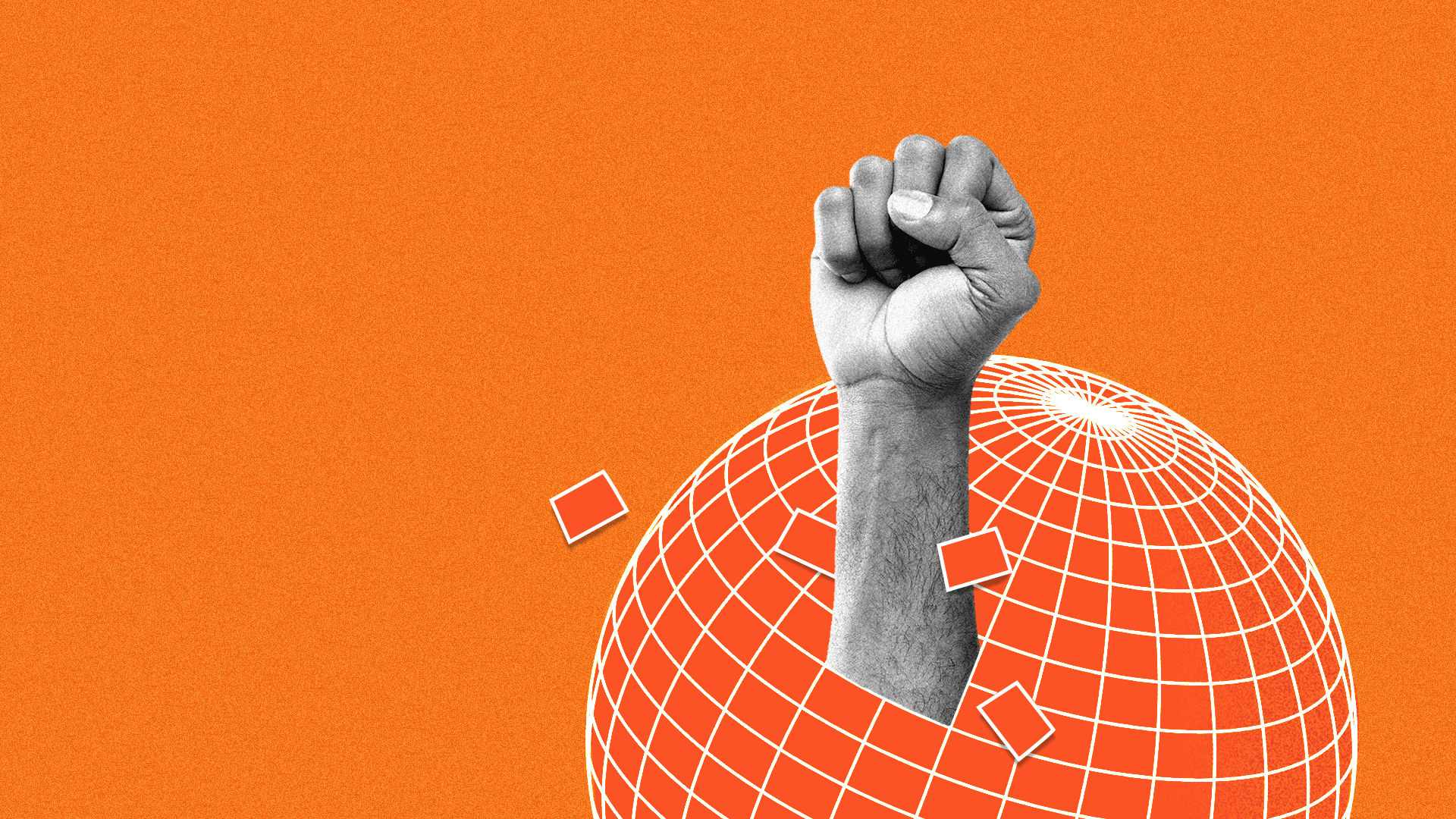 |
|
| Illustration: Aïda Amer/Axios |
| |
| Revolution has gone global. The same three-fingered salutes appeared in the streets of Burma and Bangkok, and the "be like water" mindset that allowed Hongkongers to evade police was adopted in Belarus. Why it matters: Protesters calling for democracy are united across continents in their struggle. And they have indeed been struggling. The sheer scale of the public demonstrations in all of these cases generated a sense that something had to give. - In most cases, nothing did. In Hong Kong, it was the embers of autonomy from Beijing that were snuffed out.
In Belarus, dictator Aleksandr Lukashenko has clung to power and to his benefactor, Vladimir Putin. - Lukashenko has shrugged off warnings of sanctions (a fourth round is in the works) and allegations of torture from Europe.
- Given Putin's designs on a Russia-Belarus commonwealth, the country's sovereignty may now be in greater danger than Lukashenko's rule.
- The state of play: Exiled opposition leader Svetlana Tikhanovskaya continues to call for protests, but the popular revolt that flooded the streets week after week following a sham election in August has gone quiet.
|
    |
| |
| |
| A message from Malwarebytes Small Business Solutions |
| Malwarebytes secures small businesses from hackers |
| |
 |
| |
| Malwarebytes offers cybersecurity options for businesses of all sizes. Why it's important: Choose from top-rated easy-to-use Next Gen AV for teams or centrally managed cloud-based Endpoint Protection & Endpoint Detection and Response, all including phone support. Check it out. |
| |
| |
| 4. Stalled revolutions II: Burma and Bangkok |
 |
|
| Sirapob Phumphengphut, a Thai anti-government protester, gives a three fingers salute while being held inside a prisoner transport vehicle. Photo: Sirachai Arunrugstichai/Getty Images |
| |
| The protests in Myanmar are similarly dwindling, with some 800 killed and thousands detained, and the military is still in power three months on from the coup. Zoom in: Each night, military-controlled TV announces a list of people charged with political crimes. The internet is cut, and homes across the country are raided, the NYT's Hannah Beech reports. Despite the pervasive fear, economic strikes and acts of defiance continue. - A shadow government of ousted officials has announced the creation of a "People's Defense Force." Some hope it will eventually unite with the ethnic militias already engaged in armed conflict with Myanmar's military.
- In the meantime, the military continues to respond to any perceived threat with relentless violence.
Thailand's pro-democracy movement has also been dealt blow after blow. - Two student protest leaders are on hunger strikes in prison and they're reportedly in grave health. They stand accused of insulting Thailand's untouchable monarchy.
- Flashback: Massive, youthful crowds gathered last year to protest the prime minister, who took power in a 2014 coup. But some also challenged the king — a fairly eccentric figure who spends most of his time in Germany but controls much of the country's wealth.
- The establishment struck back earlier this year with a wave of arrests and increasingly repressive tactics. COVID-19 restrictions also helped break the protesters' momentum.
|
    |
| |
| |
| 5. Stalled revolutions III: Algeria and Uganda |
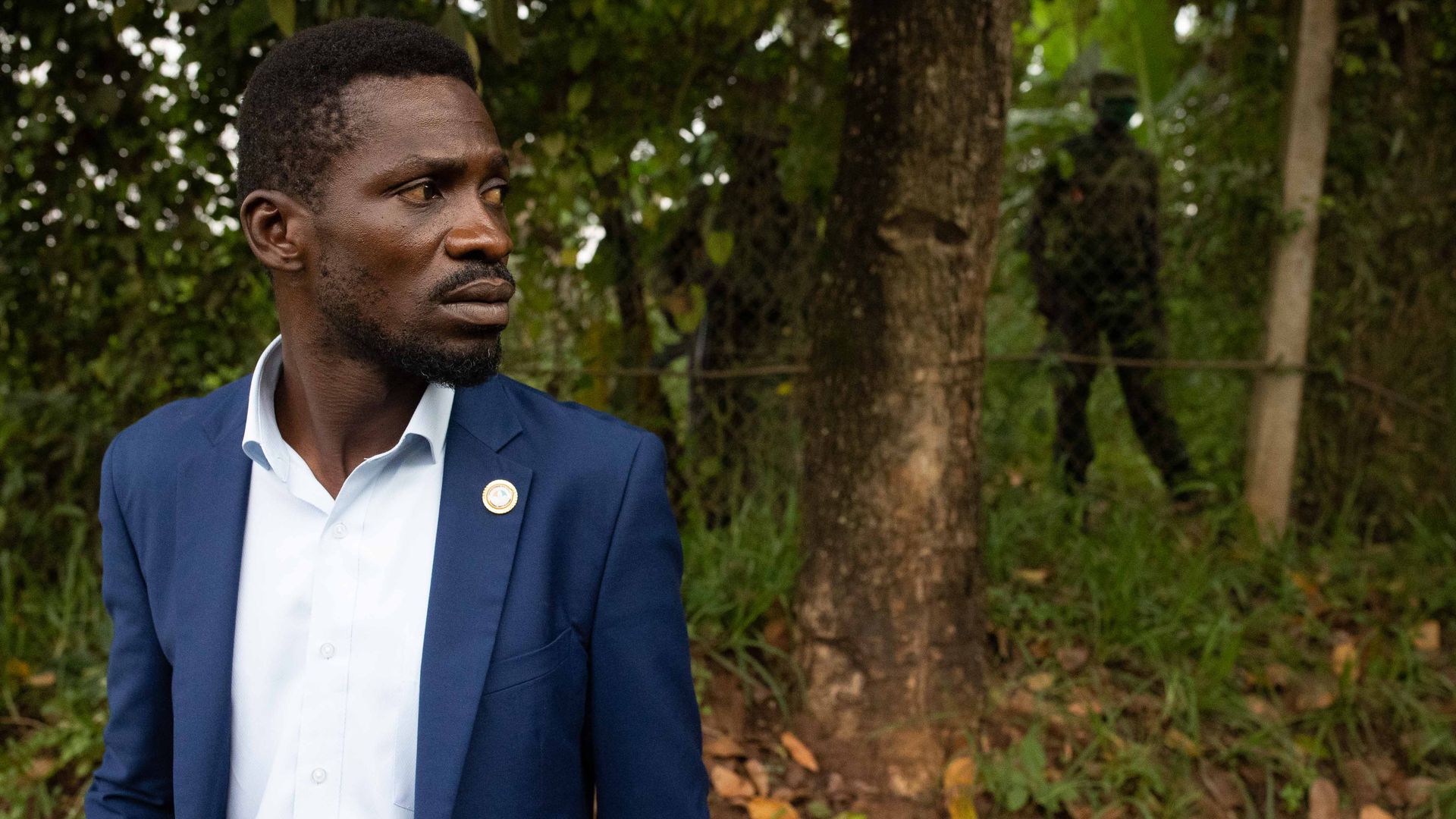 |
|
| A Ugandan soldier over Bobi Wine's soldier during the chaotic election aftermath. Photo: Luke Dray/Getty Images |
| |
| The fight isn't over in any of these cases — or in Algeria, where a protest movement recently resumed after a COVID-enforced hiatus, only to be effectively banned on Sunday. The backstory: Known as the Hirak movement, the protesters managed in 2019 to topple their ailing president, Abdelaziz Bouteflika, but not the entrenched elite whose interests he represented. - The government used COVID-19 as a cover for surveillance and suppression over the past year, during which they arrested dozens of pro-democracy activists.
- Now the Interior Ministry has announced that any protests will require official approval — another step toward ensuring that the revolution remains unfinished.
Meanwhile, with Ugandan President Yoweri Museveni set to be sworn in for a sixth term on Wednesday, his rival Bobi Wine says members of his political movement continue to be abducted and tortured. - Why it matters: When the pop star stood against Museveni, he became a symbol of the broader opposition to Africa's aging strongmen, who have been trampling term limits and rigging elections.
- But Museveni was not content with declaring victory at the ballot box in January.
- The legal grounds for arresting Wine's supporters appear dubious. At least 84 have faced charges relating to their wardrobes — mostly for wearing red berets in Wine's trademark style, Liam Taylor reports in The Continent.
The bottom line: Symbols of revolution have spread around the world. Success, as yet, has not. |
    |
| |
| |
| Bonus: Where in the World? |
 |
|
| Screengrab via Apple Maps |
| |
| I'm glad so many of you like our new game! The first one was tough. Hint: We're staying in the Southern Hemisphere but visiting a big port city this time — I think you'll have a good hope of getting it right. Scroll to the bottom for the answer. |
    |
| |
| |
| 6. What I'm reading: How the U.S. killed Soleimani |
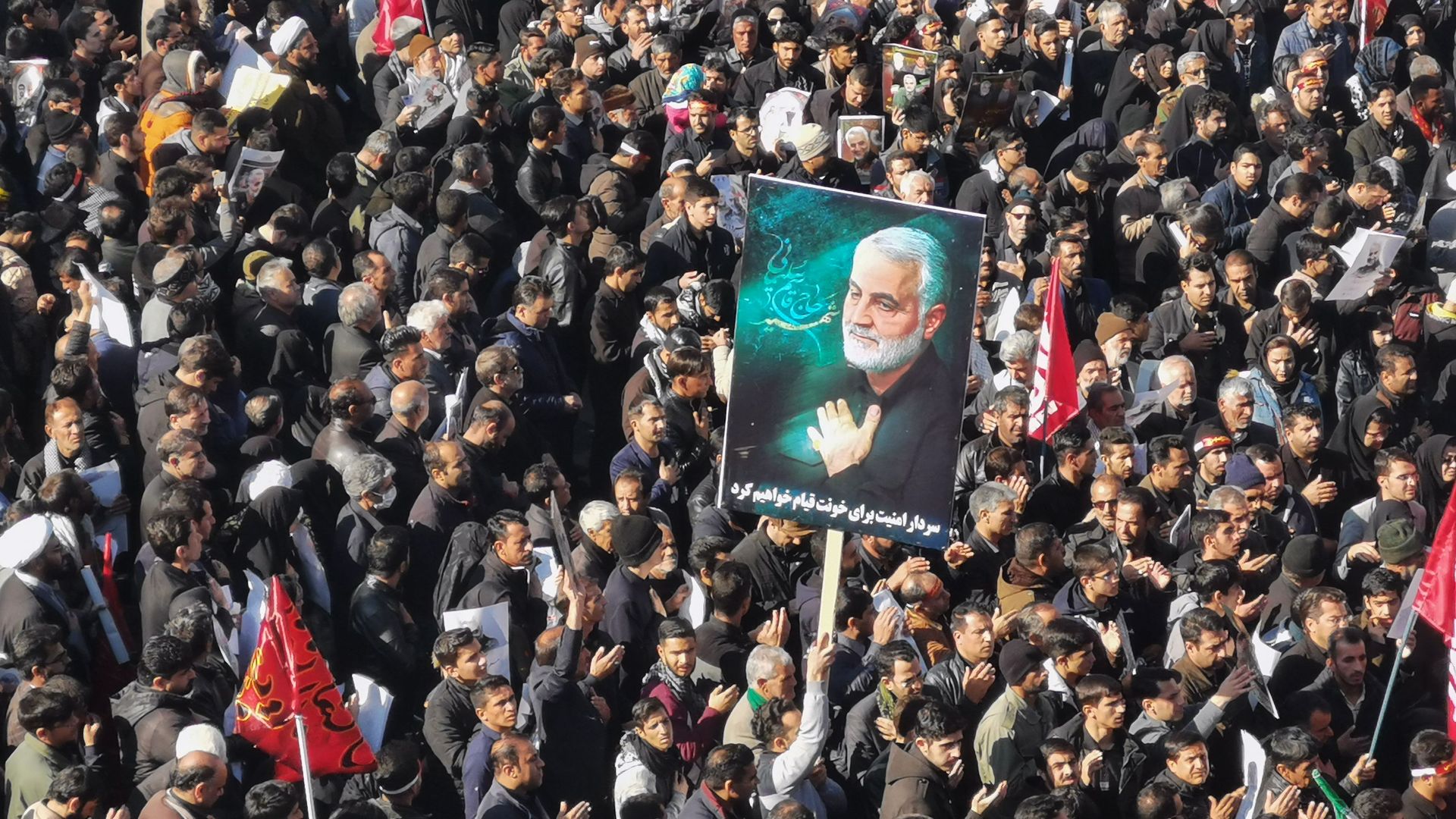 |
|
| Mourning Soleimani's death in Tehran. Photo: Atta Kenare/AFP via Getty |
| |
| Delta Force snipers disguised as airport maintenance workers. An elite Kurdish unit, playing the role of ground crew and luggage handlers. Israeli intelligence tracing cell signals. Drones waiting overhead. That's the scene set by Jack Murphy and Zach Dorfman in an incredibly detailed blow-by-blow account of the assassination of Iranian Gen. Qassem Soleimani for Yahoo News. Flashback: Mike Pompeo called a meeting to discuss killing Soleimani almost immediately after becoming CIA director in 2017, they report. - The Pentagon was more cautious, likening the risks of killing Soleimani to "nuclear war," one former high-ranking official said.
- A small group of senior officials started meeting regularly in 2019 to discuss options for taking out the general. After a U.S. contractor was killed by Iranian proxies in Iraq that December, options were presented to Trump.
- The U.S. military had developed plans to kill a number of Iranians, not just Soleimani.
- The CIA worried that, in response, Iran could "kill members of the Saudi or Emirati royal families, launch attacks on oil infrastructure, or foment coups."
On the day of the strike, top officials listened into audio feeds from the Situation Room, the Pentagon and Mar-a-Lago. - After it was over, a Kurdish operative "walked up to the wreckage of Soleimani's vehicle, snapped photographs and quickly obtained a tissue sample for DNA confirmation," Murphy and Dorfman write.
What to watch: The full scale of the Iranian response is yet to be seen, sources believe, and current and former U.S. officials could be at risk of assassination. Read the piece. |
    |
| |
| |
| 7. Stories we're watching |
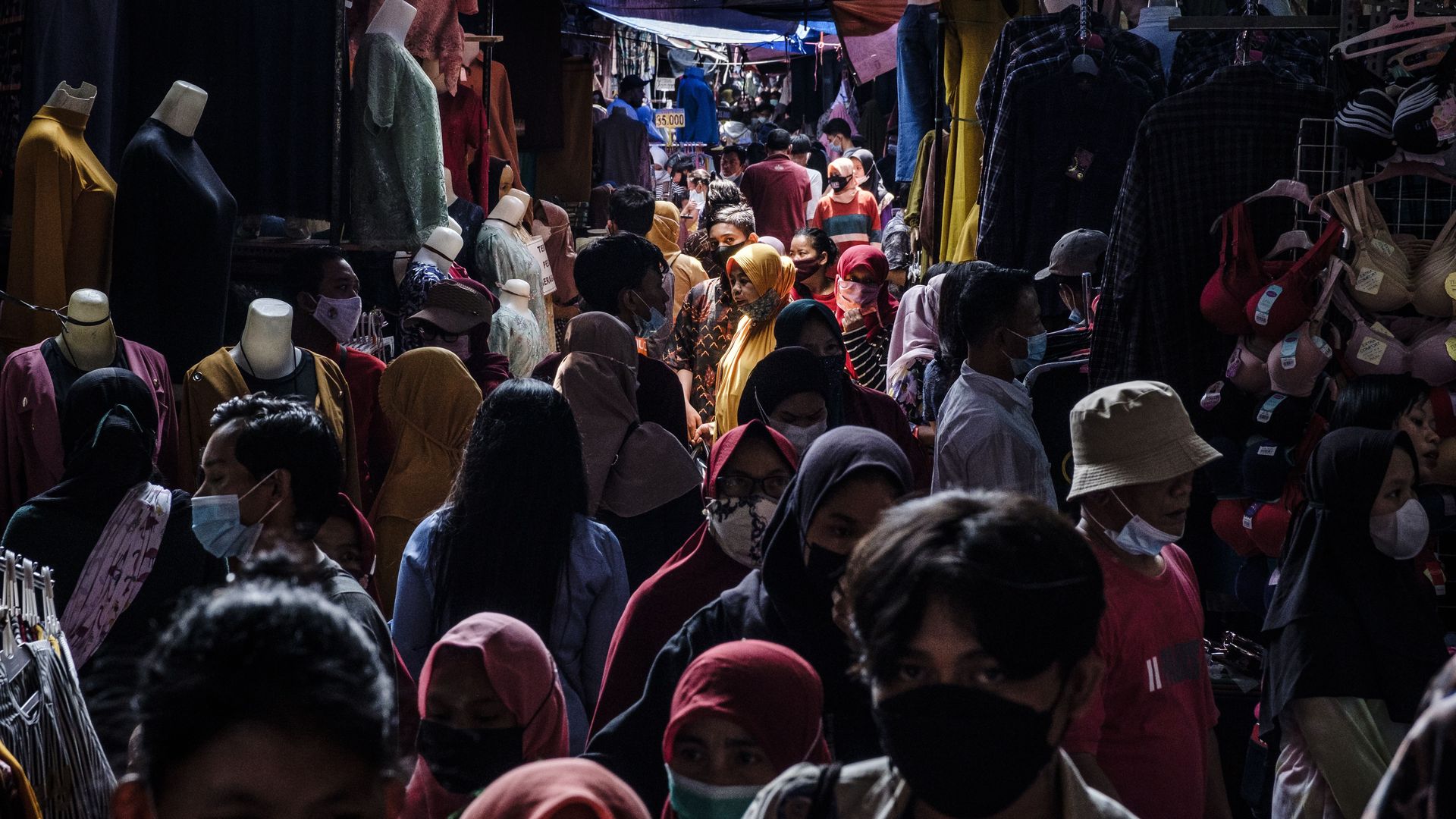 |
|
| Shopping for Eid al-Fitr in Jakarta. Photo: Ed Wray/Getty Images |
| |
- 85 dead in Kabul school attack
- India's deadliest day
- COVID surge in SE Asia
- Navalny's "prisoner of conscience" status restored
- World's dollar reserves hit 25-year low
- U.S. Navy seizes weapons from ship likely headed to Yemen
- Debris from Chinese rocket splashes back to Earth
Clipped: In lieu of a quote, please enjoy this clip of Uzbek military chiefs who couldn't quite get their act together at a Victory Day parade over the weekend. |
    |
| |
| |
| A message from Malwarebytes Small Business Solutions |
| Malwarebytes secures small businesses from hackers |
| |
 |
| |
| Malwarebytes offers cybersecurity options for businesses of all sizes. Why it's important: Choose from top-rated easy-to-use Next Gen AV for teams or centrally managed cloud-based Endpoint Protection & Endpoint Detection and Response, all including phone support. Check it out. |
| |
| Answer: Cape Town, South Africa. Was "good hope" too big a hint? |











No comments:
Post a Comment